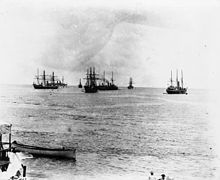Tripartite Convention
| Convention between the United States, Germany, and Great Britain Governments in Respect to Samoa | |
|---|---|

German, British and American warships in Apia harbour, 1899
|
|
| Signed | 2 December 1899 |
| Location | Washington |
| Effective | 16 February 1900 |
| Signatories | |
| Citations | 31 Stat. 1878; TS 314; 1 Bevans 276 |
| Abrogated the Treaty of Friendship and Commerce Between the United States and the Government of the Samoan Islands of 17 February 1878 (20 Stat. 704; TS 312; 1 Bevans 437). Abrogated the Treaty of Berlin of 14 June 1889 (26 Stat. 1497; TS 313; 1 Bevans 116). | |
The Tripartite Convention of 1899 concluded the Second Samoan Civil War, resulting in the formal partition of the Samoan archipelago into a German colony and a United States territory.
Forerunners to the Tripartite Convention of 1899 were the Washington Conference of 1887, the Treaty of Berlin of 1889 and the Anglo-German Agreement on Samoa of 1899.
By the 1870s modern economic conditions were well established and accepted by the Samoans, who had just enough of a government that could be manipulated at will by the foreign business interests in Samoa. After the United States concluded a friendship treaty with Samoa in 1878, Germany negotiated her own Favorite Nation Treaty in 1879 with the same Samoan faction as the U.S., while later in 1879 the Anglo-Samoan treaty was completed with a rival faction. Contentions among the whites in Samoa, plus native factional strife led to side-choosing that became deadly warring with the introduction of modern weapons.
Washington conference of 1887
To attempt to resolve some of the problems, the United States, Germany and the United Kingdom agreed to a conference at Washington in June 1887. After the surfacing of serious disagreements among the parties, the conference adjourned without results. Fighting by nationals of the three powers with their factional local allies led to a conflict that was only tempered by the Apia hurricane of 1889 that wrecked warships on the verge of hostilities.
Treaty of Berlin of 1889
The seriousness of the situation was finally recognized and German foreign minister Count Herbert von Bismarck (chancellor Otto von Bismarck’s son) proposed to reconvene the adjourned Washington conference of 1887. He invited U.S. and British representatives to Berlin in April 1889. Bismarck’s pragmatic approach proposed protection for life, property and commerce of the treaty participants and relegated native government and their unstable "kings" to the Samoans, with which the British concurred. The United States insisted on a three powers authority while preserving native rights. In the Treaty of Berlin of 1889 thus a joint protectorate or condominium was declared, with a European/American chief justice, a municipal council for Apia, and with the "free right of the natives to elect their Chief or King" as the signatory to the act, thus the treaty professed to recognize a Samoan independent government.
...
Wikipedia
